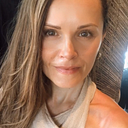What can we do to scale down gender inequality in film creation?
She believed she could so she did. Stefanie Sparks has been working in film for almost half of her life. Starting out on indie film sets in Seattle and reality TV in LA, Stefanie quickly made her way to NYC and the New School. She earned her MA in Media and Film in 2009. Her thesis film, Bleed, screened at STIFF (Seattle) and won special recognition for short form comedy at the Dorothy Hirshon Film Festival. She was granted a Jerome Foundation New York Filmmaker Grant for her debut feature, Cathy Coppola, which was nominated for the audience award at Brooklyn Girl Film Festival and Best in Show at the Female Eye Film Festival (Toronto). For the last few years, Stefanie has worked at the Ghetto Film School’s Midwinter Institute (the nation’s first all film high school located in the Bronx, NY) where she teaches no-budget film making to high school kids. In Case of Emergency is her second feature film and continues her obsession with female ambition, comedy and the dark side of both.
Agnes Wielgosz: According to a new report from the World Economic Forum, it may take women around the world more than two centuries to attain gender equality. The cost of the missed economic opportunity is honestly too high. What can we do to close the gender gap?
Stefanie Sparks: I think that if we move forward at the rate we have previously moved forward, then, yes this would take a very long time. However, I don’t know if we’re really aware of the world we currently inhabit. We’re in the midst of a cultural revolution the likes of which our world has never seen before so I don’t know if we can predict anything now. This is great and exciting and I think in order to move forward at a more rapid pace and to embrace the ever-changing world we ALL have to get used to being uncomfortable. We have to shed our old way of thinking.
For women, I think this means supporting each other even when it’s not for our benefit. It’s difficult for us to do this, I think, because we’ve historically had so very little that we had to fight each other for it. Whether is was in regards to a job, a job or anything. When you have so little opportunity, of course you’re going to be ultra competitive with each other to have it. This is why men don’t treat each other as ruthlessly as women. White men, at least, have historically had the world at their fingertips. Most of them only have to show up and they are given power. In terms of moving forward, we need to understand as women, that it’s all open to us now and we will continue to have more and more opportunities because the veil has been lifted, so to speak. But the only way to move forward is to continue to support one another and manifest this idea that we are equal because we say we are. We don’t need anyone else’s opinion or permission. The future is ours now and forever.
AW: Let’s shed light on gender inequality in the film industry. How can we uphold the human rights in the film industry from a gender perspective?
SS: In regards to closing the gender gap, it’s extremely important to have stories told from the female point of view because, for the last 100 years or more, the only point of view we’ve had is male. If we can start to see ourselves through a different lens, all of us, not just women but if we can see men through the female gaze, as well, then we have no idea how this can change our world for the better and at what pace.
AW: Talent is one of the most imperative factors for growth and competitiveness. How can we stay confident in our power? How can we embrace ‘women power’?
SS: The only way to embrace women in power is to do exactly what you’re doing. We have to actively seek women who are doing things in leadership roles and celebrate them. Historically, we’ve just been ignored. So when we look back it’s very difficult to find women in power to model ourselves after, especially in America. We’ve only had the right to vote for 100 years! When I need inspiration, I look to women like Frida Kahlo. I go back and I read about her life and all that she’s overcome and it keeps me moving forward. I think this is one way to embrace women in power, celebrate them. We have to also understand that confidence is not the most important thing to success. People tell you it is and it’s good to have but other attributes can sometimes help compensate. For me, I am stubborn. I keep moving forward even when others would quit and this had created its own level of sureness for me. I know that no matter what happens on film, I will not quit and this gives other people confidence in me which then helps us move forward and make the film. Know your talent, be honest about what it is and move forward.
